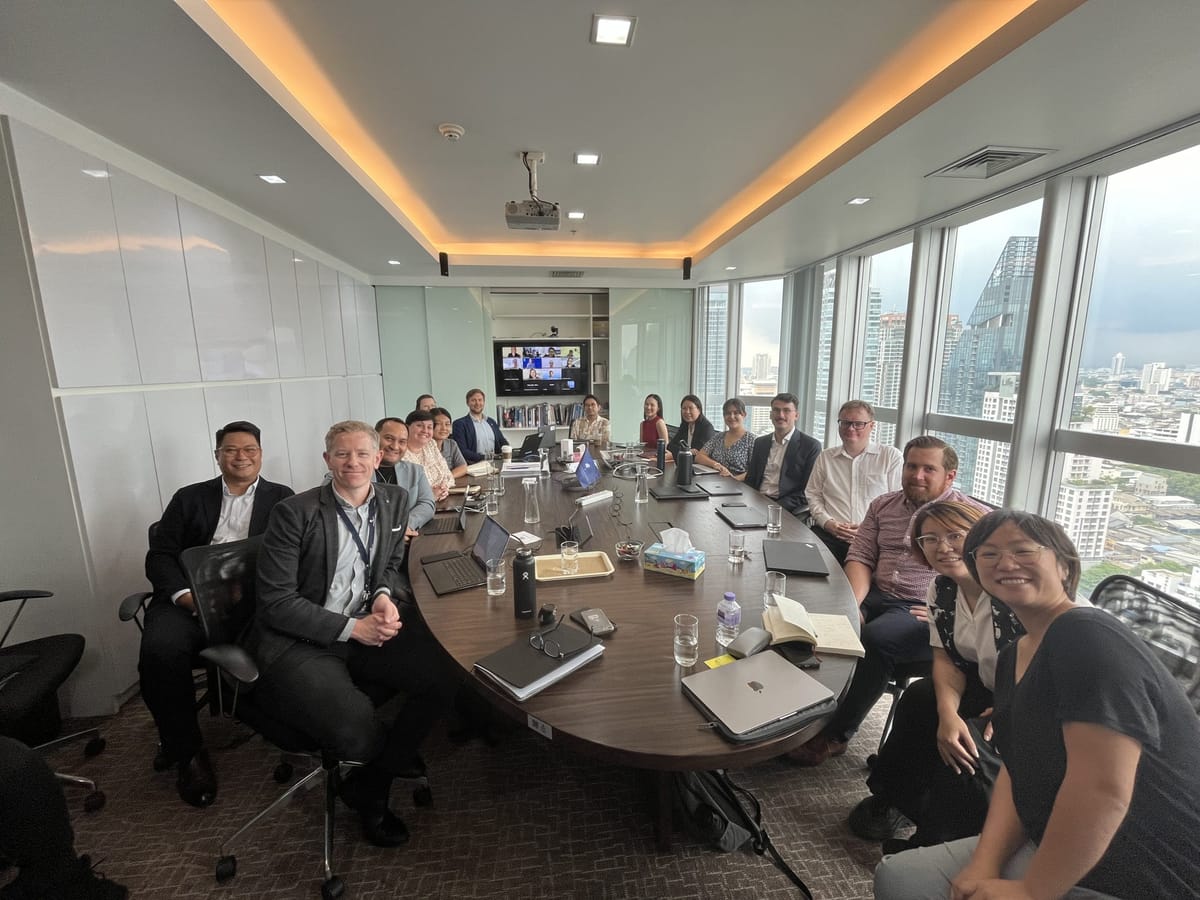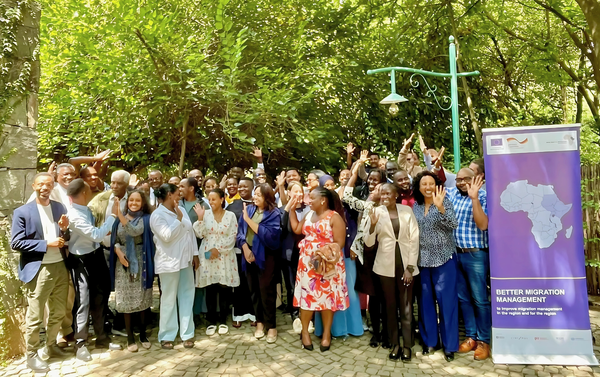CSO knowledge is crucial in responding to cyberscam-related trafficking

The response to human trafficking for forced criminality must include CSO perspectives, a new law helps protect domestic workers in Ukraine, and UN experts flag up the risk of trafficking and exploitation faced by migrant workers in the UK.
The importance of non-governmental and civil society perspectives in identifying actionable responses to trafficking for forced criminality was highlighted at a workshop in Bangkok last week. Organized by the Regional Support Office (RSO) of The Bali Process, in partnership with Freedom Collaborative, the event was the latest meeting of a group of international organizations and civil society groups from across Southeast Asia, who convene monthly for regular information exchange amid increasing attention and involvement from the numerous sectors affected by cyberscam crimes.
Participants spoke at length about why incorporating input from civil society is a necessary part of an evidence-based response, pointing out that coordinating with civil society organizations (CSOs) and experts on the ground is essential for an accurate understanding of the cyberscam situation and gaps in the current approach. Because these groups have access to first-hand accounts of operations and traffickers’ methods, and are experts in the practical challenges involved and the needs of survivors, it is crucial they have a seat at the table to ensure their insights inform strategies and actions, participants said.
Furthermore, building and expanding upon existing partnerships between civil society, government agencies, and private companies is crucial due to the rapid expansion of the cybercrime industry, its complex cross-border structure, and the increasing sophistication of its operations. In order to break the grip of criminal gangs over local economies, remove their influence over local officials, and disrupt the ease with which they are able to move their operations from one location to another, it is vital that stakeholders from all relevant sectors come together to tackle their networks, creating as many barriers as possible to the flow of money from victim to criminal, including rigorous trafficking prevention measures.
Building on recommendations made in Trapped in Deceit – the RSO’s policy brief released in early 2023 which provided a situational overview on the then-emerging issue of trafficking into cyberscam centers – the workshop sought input from regional actors and experts to prioritize and strengthen recommendations by assessing progress made since the brief’s release. The role of government officials and the private sector was also highlighted, and yielded concrete pathways to enhance regional responses to this complex challenge, including: engaging tech companies, financial institutions and crypto exchanges to develop tools for identifying and removing suspicious content, enhancing user protection, and facilitating the retrieval of victims’ money; better cross-border collaboration and information-sharing among law enforcement agencies; building the evidence base and encouraging increased pressure from the international community to address corruption; raising awareness among at-risk populations and building the capacity of frontline officials to identify potential victims; and enhancing support for victims, using a multi-disciplinary approach to victim identification and assistance.
The working group was established as an information forum for sharing critical updates amid the swift expansion and increasing sophistication of the criminal networks behind cyberfraud and its related crimes, including human trafficking. It fosters collaboration to collectively understand ongoing developments and drive international coordination to identify shared challenges and practical needs for implementing programmatic services and actions. Freedom Collaborative has been running the group since August 2023, specifically to address duplication and enable coordination as more organizations and actors become involved in the response, with a particular focus on supporting CSOs and practitioners working on the ground.
Findings and insights from the workshop will be used to develop updated recommendations to further support regional efforts in countering cyberscam center operations.
Here’s a round-up of other noteworthy news and initiatives:
The United Nations High Commissioner for Refugees has reported to the Security Council on the worsening global refugee crisis due to war and persecution, emphasizing the need to address underfunded humanitarian programs. Specific crises in Gaza, Syria, Myanmar, the Democratic Republic of Congo, Ukraine, and Sudan were highlighted, and the international community was urged to address the displacement and refugee situations in these regions.
The Global Initiative Against Transnational Organized Crime has published its Human smuggling and trafficking in North Africa and the Sahel 2024 series, with a focus on Libya, Tunisia, Morocco, Mali, Niger, Chad and Sudan. The report analyzes the trends in human smuggling in Libya and Tunisia, as well as the increasing movement of Sudanese refugees in North Africa and the Sahel. It also highlights key political and security dynamics in the regions.
Domestic workers in Ukraine have won significant protections due to a new law regulating their work. The law recognizes domestic work and workers, affording them labour rights and guarantees. Tristan Masat, Solidarity Center Ukraine country program director, called it an important development for Ukraine’s human rights protection and Euro-integration efforts. Tetiana Lauhina, founder of the Union of Home Staff, said a major next step would be for Ukraine to ratify the International Labour Organization’s Convention 189 on domestic workers.
This newly published FAST Thematic Review calls on the financial sector to play its role in protecting vulnerable people and eradicating modern slavery by 2030. The report recommends making financial services more accessible, affordable, and suitable for all, with a focus on consumer safety and with consideration for the diverse needs of vulnerable populations. Additionally, addressing poverty and underlying vulnerabilities is crucial in reducing financial vulnerability to modern slavery, the report says.
UN experts on human trafficking, modern slavery and human rights have expressed alarm at the systemic exposure of migrant workers in the UK to protection risks related to deception, exorbitant recruitment fees, debt bondage, undignified living conditions, and potential deportation, calling for urgent reform of the current system governing labour migration. In particular, they highlighted the shortcomings of the Seasonal Worker Scheme, in which some recruitment agents illegally charge workers more than £3,000 to secure employment in the UK, pushing them into debt bondage.
Meanwhile, British social care agencies have been accused of exploiting foreign workers, leaving people living on the breadline as they struggle to pay off debts run up while trying to secure jobs that fail to materialize. Dozens of people working for 11 different care providers say they paid thousands of pounds to agents to secure jobs working in UK care homes or residential care, with most finding limited or no employment when they arrived. Many are now struggling to pay off huge debts in their home countries by working in irregular jobs for below the minimum wage.
Charities that support the basic needs of migrants crossing the U.S. border fear for the safety of their employees and volunteers amid heightened tensions and extremist rhetoric as the U.S. general election looms. Faith-based groups have increasingly become the subjects of conspiracy theories and targets for far-right activists and Republican members of Congress, who accuse them of promoting the displacement of white Americans and engaging in child trafficking and migrant smuggling, according to The New York Times.
The Funder Safeguarding Collaborative is looking for a Safeguarding Advisor and a Membership Officer based in the UK. The closing date for applications is 28 June.




